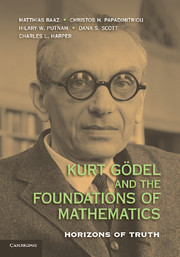Book contents
- Frontmatter
- Contents
- Contributors
- Foreword
- Preface
- Acknowledgments
- Short Biography of Kurt Gödel
- I Historical Context: Gödel's Contributions and Accomplishments
- Gödel's Legacy: A Historical Perspective
- 3 The Reception of Gödel's 1931 Incompletability Theorems by Mathematicians, and Some Logicians, to the Early 1960s
- 4 “Dozent Gödel Will Not Lecture”
- 5 Gödel's Thesis: An Appreciation
- 6 Lieber Herr Bernays! Lieber Herr Gödel! Gödel on Finitism, Constructivity, and Hilbert's Program
- The Past and Future of Computation
- Gödelian Cosmology
- II A Wider Vision: The Interdisciplinary, Philosophical, and Theological Implications of Gödel's Work
- Gödel and the Mathematics of Philosophy
- Gödel and Philosophical Theology
- Gödel and the Human Mind
- III New Frontiers: Beyond Gödel's Work in Mathematics and Symbolic Logic
- The Realm of Set Theory
- Gödel and the Higher Infinite
- Gödel and Computer Science
- Index
4 - “Dozent Gödel Will Not Lecture”
Published online by Cambridge University Press: 07 September 2011
- Frontmatter
- Contents
- Contributors
- Foreword
- Preface
- Acknowledgments
- Short Biography of Kurt Gödel
- I Historical Context: Gödel's Contributions and Accomplishments
- Gödel's Legacy: A Historical Perspective
- 3 The Reception of Gödel's 1931 Incompletability Theorems by Mathematicians, and Some Logicians, to the Early 1960s
- 4 “Dozent Gödel Will Not Lecture”
- 5 Gödel's Thesis: An Appreciation
- 6 Lieber Herr Bernays! Lieber Herr Gödel! Gödel on Finitism, Constructivity, and Hilbert's Program
- The Past and Future of Computation
- Gödelian Cosmology
- II A Wider Vision: The Interdisciplinary, Philosophical, and Theological Implications of Gödel's Work
- Gödel and the Mathematics of Philosophy
- Gödel and Philosophical Theology
- Gödel and the Human Mind
- III New Frontiers: Beyond Gödel's Work in Mathematics and Symbolic Logic
- The Realm of Set Theory
- Gödel and the Higher Infinite
- Gödel and Computer Science
- Index
Summary
Kurt Gödel spent barely fifteen years in Vienna – less than in Brno, where he was born, and less than in Princeton, where he would die. However, the years from 1924 to 1939 constituted his formative period. He was deeply affected by the extraordinary cultural and intellectual flowering of what has been called “Vienna's Golden Autumn,” and he may one day be seen as its most prestigious scion.
The University of Vienna, in particular, played a pivotal part in Gödel's life. To the end, he remained grateful for the education it provided him; however, he could never forget the bureaucratic pettiness and the hassles he encountered from his alma mater's administration (Sigmund, 2006; Dawson and Sigmund, 2006; Sigmund et al., 2006; Buldt et al., 2002).
The story of Gödel's Vienna years can be divided into three parts: the first is a tale of brilliant success leading to early recognition, his PhD degree, and his Habilitation (professorial qualifications); the second part deals with the confused period between Hitler's rise to power in Germany and the Anschluss, the annexation of Austria in 1938, and is marked by political unrest as well as by long periods of leave due partly to Gödel's visits to Princeton in the 1930s and partly to his recurrent health problems that repeatedly forced him to withdraw into sanatoriums; and finally, the third part is dominated by Gödel's problems after the German takeover. He was politically suspect, plagued by hostile authorities and under the threat of being drafted into the Wehrmacht (Germany's unified armed forces).
- Type
- Chapter
- Information
- Kurt Gödel and the Foundations of MathematicsHorizons of Truth, pp. 75 - 94Publisher: Cambridge University PressPrint publication year: 2011
- 1
- Cited by



